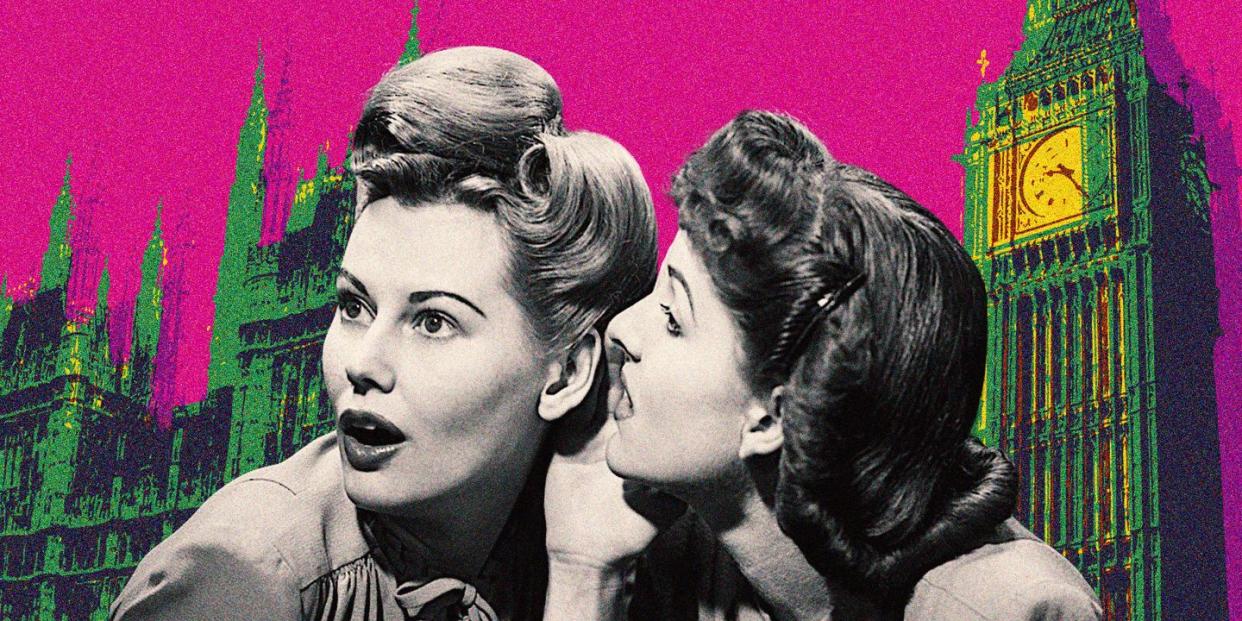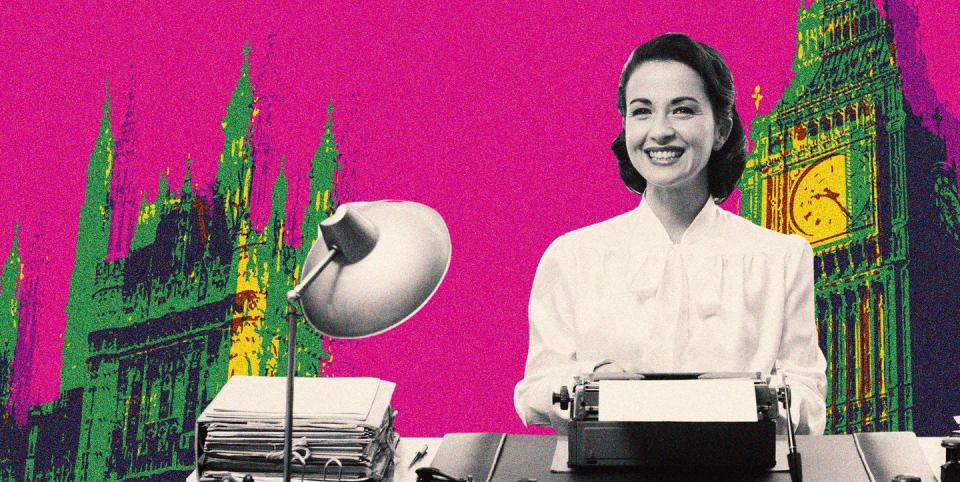‘I’m a Westminster insider: here’s what’s happening behind-the-scenes today’

During the last general election in 2019 (and the Conservative leadership campaigns that led to a Liz Truss and then Rishi Sunak-led government), I was a civil servant. So, it’s been a while since I could watch this kind of political event without also thinking ‘Oh my god, what does this mean for my job in the morning?’ and about which ministers were about to suddenly become my new boss and run my department.
My usual plan to watch all night with friends, complete with a mountain of snacks and Diet Cokes, was interrupted by Sunak’s decision to call a snap election in July. I’d already booked a holiday for the big day. Which is how I came to write this behind-the-scenes look at what happens now for those who work in politics from a dark hotel room in Barcelona as the results trickled in (I guess I could switch a light on, but I don’t think my American husband – who doesn’t quite ‘share my passion’ for watching elections unfold minute by minute – would appreciate it).
But the change we’re all in the thick of witnessing right now is truly seismic. And if you work in Westminster, like I used to and many of my inner circle still do, it will hit even harder.
‘Today we start the next chapter’
First, let’s give a little context to this monumental day. Although it’s been clear for some time that we were going to see a Labour victory, it was only around 5am this morning that it became official and Sir Keir Starmer, Britain’s new Prime Minister, gave his victory speech saying, “Today we start the next chapter, begin the work of change, the mission of national renewal and start to rebuild our country.” Exiting PM, Rishi Sunak, described the landslide result as a “sobering verdict”.
After 14 years of a Conservative government, the results really were a massive signal that the nation is fed up – and delivering changes should be a hell of a lot easier for Labour with nearly two thirds of all MPs now being from the same party. They should be able to push through all the reforms laid out in their manifesto without much hassle.
Yet, underneath it all, Labour has still won a relatively low share of the vote (around 33%, not much more than 2019). So, how has Starmer’s party done it? Three reasons: our electoral system, tactical voting and some very, very close results.

Britain’s voting system means a party can get millions of votes and very few (if any) seats. Reform got over four million votes and only four MPs elected. The Lib Dems got less than four million votes, yet now have 71 MPs. Labour’s clever campaign meant they racked up votes where it counted and have been rewarded with a mammoth victory. The overriding feeling that people wanted change meant voters got wise with tactical voting and finally, there were a load of results that were nail-bitingly close, including the new Labour MP for Hendon, David Pinto-Duschinsky, who won by a mere 15 votes.
Voters wanted the Conservatives out and that led to some results that were unprecedented too; 11 cabinet ministers lost their seats, including the three that I have worked for Grant Shapps, Jacob Rees-Mogg and Michelle Donelan.
It all just reinforces how nothing is certain for your career in politics besides uncertainty, and on the flip side, while this was a horrifically bad night for the Conservatives, they do still at least have enough MPs to be able to ‘shadow’ the newly appointed Labour ministers (having won 119 seats vs Labour’s 400+). While this might not seem positive for those who are anti-Tories, I’d argue that you need a functioning opposition in democracy which is also leading on work in areas like healthcare, education or transport.
Ultimately, shadow ministers make the government better by putting its work under scrutiny, challenging plans and holding those in charge to account. Now, with a strong third party in the Lib Dems, as well as a decent number of smaller parties and independents, there should be plenty of opportunity for this to happen.
Yet for those Conservative party staffers working for those MPs who lost – hundreds of people – this means immediate redundancy and likely attempts to get a job in the private sector instead. For many, perhaps for the first time ever. Conversely, for Labour, Greens, Reform and Lib Dems, huge numbers of jobs will now open up for those looking to begin a career working for a parliamentarian. Of course everyone has to start somewhere, but the majority of these staffers will be new to Parliament just like their MPs – which means a steep learning curve to ensure constituents (us!) still get a good service when we face local issues.
What happens after an election?
For the MPs who won last night, including a record number of women (220 in 2023 vs 264 now), and particularly the new Labour frontbench team, there will barely be time to tour their new office before they’re tasked with making critical decisions. The King’s Speech – the list of the new laws Labour plan to prioritise – is slated for 17 July, and for ministers wanting to have their ideas included, work must begin immediately. Secretaries of State will need to decide how they want to run their new department, what decisions to delegate to junior ministers and what their own priorities to push forward are.
While it’s ‘all change’ for the ministerial teams (including their political advisers), the permanent civil service remains in place. This means that, while getting a new boss in itself isn’t usual (no matter your industry), for civil servants – like I was – you wake up one day to find you have a new boss and the entire company you work for has changed overnight.
For the previous ministers, there isn’t even the chance to say goodbye, let alone organise a whip round and card as you might do if a colleague leaves your office under more ‘traditional’ circumstances. Yes, it’s the nature of the job and they go into it knowing that they’re only in the role until the public wants them out, but underneath that, there are still very human stories of mums, dads and friends who are suddenly out of work and contemplating a very different future outside of Parliament.
While many Conservative MPs and advisers I knew were making contingency plans for a life outside of government anyway, they had expected an election to take place much later on. So, for some, they now feel they’ve been left ‘high and dry’ – waking up out of office and competing with oodles of ex-MPs and staffers for new jobs. And that competition is going to be pretty stiff, given over 150 MPs have lost their seats.
For those waking up with shiny new jobs, like new ministers entering their workplace for the first time, first impressions are vital. When I was communications lead at the business and then technology governmental departments, I would always advise a new minister to set the tone early, and to arrange a visit to place that informs the public what their priorities are. An education minister, for example, might go to a nursery to show they’ll be focussing on those first years of a child’s life. Or a business minister might go to a small company in a northern town to indicate they’ll be backing entrepreneurs across the country. It’s often said that ‘advisers advise and ministers decide’, and these early decisions in the first hours and days after appointment matter hugely in helping to shape opinion of what kind of a minister a person will be.
As a staffer, you also need to quickly learn what makes your minister and new boss tick – are they a morning person? Do they prefer travelling by car or train? I’ve worked for one minister addicted to junk food and one on the Atkins no carb diet; you need to be able to flex to your new boss early on and make sure they have what they need (food included) to get through long days of big policy decisions, media interviews and meetings. You can’t just walk in with a barrage of questions either, all this needs to be established in a maximum 30-minute meeting in the first week, with the rest emerging via trial and error.
Britain has voted for change, that’s plain to see. Now? The biggest challenge for Starmer and his team is to ensure that people’s lives feel different. For women, healthcare has been the most important issue throughout this campaign followed by the economy, and I don’t think we expect quick fixes, but we do want early signals that things are changing. But the honest truth is that change is hard – and does take time.
Governments can do things that try to show who they are, e.g. Tony Blair’s then-new speedily introduced national minimum wage plan or Cameron’s legalisation of gay marriage, but the reality is that getting NHS waiting lists down, making the streets safer at night and building more homes can take years.
The difficult thing is that the low turnout in this election (set to be the lowest for 20 years) suggests some people have already totally lost faith in the ability of politics to change anything at all – and the new government needs to work hard to turn that around, on top of fulfil manifesto pledges. Labour’s reputation will rely on their ability, not just to tell people that things will change, but to prove it.
If they can’t do that? The Conservatives will have a chance to reform and change to match the mood of the country ready for the next general election. Lib Dems, Green and Reform also all have more MPs than they ever have before, putting them in good stead to be able to do the same. Today marks the start a new political era for Britain – and now, for me, time to catch up on some much-needed sleep.
You Might Also Like

 Yahoo Lifestyle
Yahoo Lifestyle 
